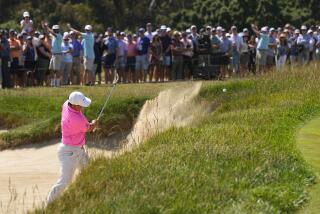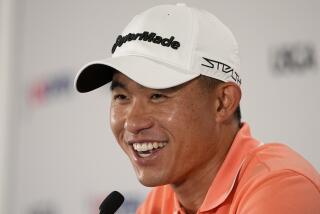Square Deal at the Belfry
SUTTON COLDFIELD, England — The unwritten Ryder Cup rules for both teams are simple, really, just a matter of counting. Ready? You start at eight and if the U.S. gets to 14 first, it’s over.
A three-day marathon that has turned into a sprint, that’s what the Ryder Cup has become, with nothing left today but 12 matches worth 12 points and equal chances for glory or gloom at the Belfry.
For the first time since the 1991 Ryder Cup at Kiawah, the U.S. and Europe start the final day in a tie. How that happened was either heartbreaking or lucky, depending on your point of view, because the 8-8 tie after Saturday wouldn’t have occurred if not for a heavy dose of the unexpected.
How often does Sergio Garcia miss a two-foot putt? He did it Saturday. Teamed with partner Lee Westwood and two up with two to play against Tiger Woods and Davis Love III, Garcia three-putted the 17th after reaching the green in two and lost the hole.
Then, at the 18th, Westwood stood over a 3 1/2-footer for par that would halve the match. He missed, pulling it.
“We got away with one,” Love said. “You never know what’s going to happen.”
Woods and Love accepted the gift, a 1-up victory in best ball, then stood back to watch Scott Hoch and Jim Furyk drop the last hole, but still halve their match with Paul McGinley and Darren Clarke, even though the U.S. had a 2-up lead through 13 holes.
Woods, who won twice Saturday, was nearly flawless in his afternoon match with Love. Woods made seven birdies, which was not so simple when his task was to hit the ball and then drag Love along.
Love, who had no birdies with David Duval on Friday, had one birdie with Woods until the 17th, where he displayed a keen sense of the dramatic by chipping in for birdie to win the hole.
Neither Love nor Woods tried to drive the par-four 10th hole, which measured 263 yards to the front, even after they saw both Garcia and Westwood make it with the match all square.
“It wasn’t the right play,” Love said. “We just didn’t hit good wedges.”
Garcia and Westwood got their birdie to take a 1-up lead, but when Woods birdied the 13th, it was even again.
Of course, by now, the unpredictable had become routine. Who except U.S. captain Curtis Strange saw a better-ball pairing of Duval and Mark Calcavecchia? Strange probably wished he hadn’t after they were 3-down to Niclas Fasth and Jesper Parnevik after seven holes.
But Duval boldly drove the green at the 10th, two-putted for a birdie and turned the match around in what became a 1-up U.S. victory. Fasth and Parnevik were 2-up at the 10th and Duval knew something had to give.
“In that situation, we needed something,” Duval said. “Really, to swing the momentum, we had to take a shot at it.”
Europe’s biggest weapon, Colin Montgomerie, improved his record to 3-0-1 and with Padraig Harrington, finally solved the Phil Mickelson-David Toms team, 2 and 1.
Even so, it’s a numbers game right now, for both sides. In the last 11 Ryder Cup competitions, the U.S. has won the singles nine times. The only exceptions were in 1995 at Oak Hill and in 1985 at the Belfry--both victories by Europe.
Thomas Bjorn doesn’t buy the theory that the U.S. usually wins Sunday.
“What is history?” he said. “Oak Hill? We won the singles, 7-5, at Oak Hill. It can be done. If we can win, 7-5, in America [with] a team that was the underdogs there, we can win the singles here.”
Sam Torrance front-loaded his singles lineup with his stars while Strange back-loaded his. Hoch leads off against Montgomerie, then it’s Toms and Garcia, Duval and Clarke, Hal Sutton and Bernhard Langer, Calcavecchia and Harrington, Stewart Cink and Bjorn, Scott Verplank and Westwood, Paul Azinger and Fasth, Furyk and McGinley, Love and Pierre Fulke, Mickelson and Phillip Price and Woods and Parnevik.
The four alternate-shot matches in the morning were an even split, with Woods-Love defeating Clarke-Bjorn, 4 and 3, and Mickelson-Toms turning it on late again to defeat Fulke-Price, 2 and 1.
But Westwood-Garcia kept rolling, having little trouble with Cink-Furyk, 2 and 1. Cink and Furyk produced one birdie in 17 holes and shot five over.
In the last alternate-shot match, Montgomerie-Langer edged Verplank-Hoch, 1-up.
Langer said Montgomerie’s play has been a vital element and credited his mental approach.
“I don’t think he was down very much the last two days,” Langer said. “He seemed very relaxed, even in the practice rounds.”
Europe maintained its one-point lead from the first day and the U.S. trailed, 6 1/2--5 1/2, when Saturday’s better-ball matches began in the afternoon.
But Strange left himself open for some second-guessing with his pairings, as soon as they were announced.
Strange benched Azinger and paired Duval with Calcavecchia, who has admitted he isn’t comfortable in better ball. Strange also kept Hoch out on the course, even though he was winless after two matches, and paired him with Furyk, which meant that Furyk would play all five matches.
All four of the U.S. teams trailed, but Strange’s moves worked out, thanks to a bold play by Duval and the putts by Garcia and Westwood that stayed out of the hole.
More to Read
Go beyond the scoreboard
Get the latest on L.A.'s teams in the daily Sports Report newsletter.
You may occasionally receive promotional content from the Los Angeles Times.










